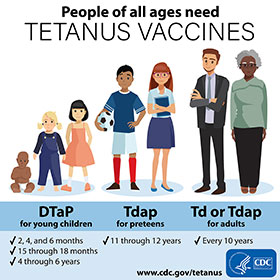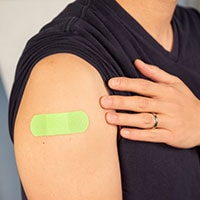Prevention
Vaccination and good wound care are important to help prevent tetanus infection. Doctors can also use a medicine to help prevent tetanus when someone is seriously hurt and isn’t up to date with tetanus vaccination.
Vaccination
The best way to prevent tetanus is to get vaccinated. CDC recommends tetanus vaccination for everyone.
This graphic highlights CDC’s tetanus vaccination recommendations for young children, preteens, and adults.
Good wound care
Immediate and good wound care can also help prevent infection.
- Apply first aid to even minor, non-infected wounds like blisters, scrapes, or any break in the skin.
- Wash hands often with soap and water or use an alcohol-based hand rub if washing is not possible.
- Consult your doctor if you have concerns and need further advice.
Medicine
Doctors may use a type of medicine called human tetanus immune globulin (TIG) for someone who has an unclean wound and is not up to date with their tetanus vaccination. These medicines provide immediate protection from the type of bacteria that causes tetanus, but it is not long lasting.




